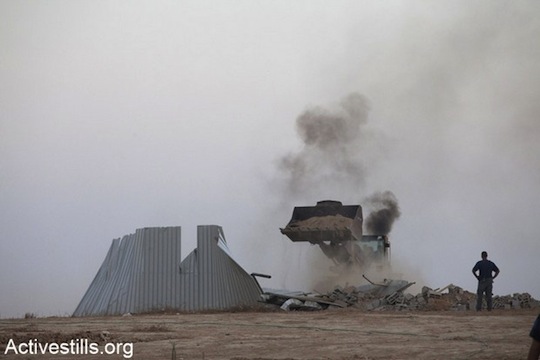For the past seven years, Israeli authorities have repeatedly demolished Al-Araqib in order to expel its residents and build a forest in its place.
By +972 Magazine Staff

The Bedouin village of Al-Araqib was demolished by Israeli authorities for the 120th time last week.
Al-Araqib is one of 35 unrecognized Bedouin villages in the Negev desert in southern Israel, which means Israel refuses to provide residents with connections to the national water and electricity grids, provide them with health and educational services, or any basic infrastructure. Over the years, the village has become a symbol of the struggle against dispossession of Bedouin from their land, and for state recognition of Bedouin villages in the Negev.
Despite being citizens of Israel that are supposed to enjoy equal rights, the Israeli government, the Israel Land Authority, and the Jewish National Fund have been waging a slow and methodical war of attrition against Bedouin residents of Al-Araqib in an effort to expel them and plant a forest atop their land.

As a result, most of the village’s residents have indeed left over the years to neighboring towns. The tactics used by the state against these citizens is similar to that which it uses in Area C of the occupied West Bank — in villages such as Susya and Khan al-Ahmar — where Palestinian residents are deprived of basic services and their homes are repeatedly demolished.
The Israel Land Authority claims the Bedouin are trespassing on state land, but the issue is still being fought in court proceedings over land ownership. While the residents do not have official land deeds, they do have documents from the Ottoman era showing their ancestors purchased the land in 1906. The state insists the land was expropriated in 1954, after the vast majority of the area’s Bedouin residents were expelled during the 1948 war, rendering the court findings regarding ownership irrelevant.
